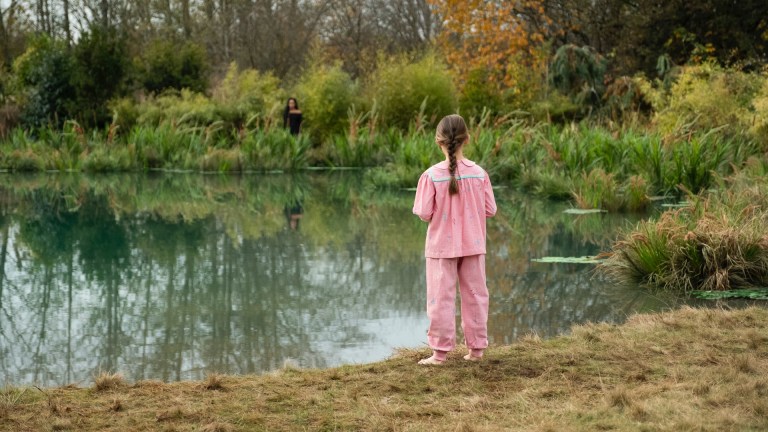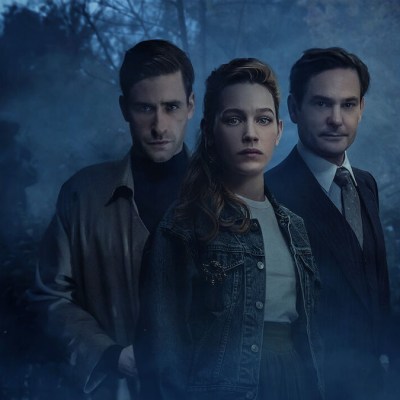The Haunting of Bly Manor: Lady in the Lake Explained
The Haunting of Bly Manor reveals how one woman’s gravity can create a haunted manor.

The following contains spoilers for every episode of The Haunting of Bly Manor.
In the final episode of 2018’s The Haunting of Hill House, a sadly departed Nell Crain (Victoria Pedretti) explains to her living siblings what makes the red room in Hill House so haunted.
“The room is like the heart of the house. No…not a heart, a stomach.”
For Netflix’s Hill House follow-up, The Haunting of Bly Manor, creator Mike Flanagan has a fresh explanation for what makes this latest titular haunted house a ghostly proving ground. It involves the trauma of a woman named Viola (Kate Siegel) and the circumstances that turn her into the malevolent creature known as The Lady in the Lake.
“One of the things that’s really fun at the beginning of each season is to answer the question of why the show’s called The Haunting,” Flanagan said in a roundtable interview with Den of Geek and other outlets. “We can’t not talk about the haunting. What is it? Why is it here? Do we need to answer that? Do we not need to answer that? Is ambiguity scarier? Sometimes it really is. Are answers necessary? Sometimes they really aren’t.”
For the second season in a row, however, The Haunting does offer an explanation, and it’s a refreshingly logical one…as far as hauntings go at least.
Bly Manor reveals the origins of its haunting in episode 8 “The Romance of Certain Old Clothes.” In this hour, the show flashes back to the distant past to tell the story of two sisters: Viola and Perdita (Siegel and Katie Parker). After the death of their father, Viola and Perdita are the conservators of the opulent Bly Manor and must find a husband to help them preserve it. Both fall for the dashing Arthur Lloyd but Viola is the one who gets to marry him.
Unfortunately, Viola falls gravely ill and slowly dies over the span of several years. In that time she becomes increasingly embittered, jealous over her sister’s health and chemistry with her husband. When Perdita can take Viola’s crankiness no more, she kills her in a fit of “mercy.” And that’s where the title of the episode comes in. For just like the Henry James story of the same name, Viola makes Arthur promise to lock her precious clothing and jewels away in a chest. Then one day when Perdita tries to open said chest, the angry spirit of Viola springs out and kills her.
Where “The Romance of Certain Old Clothes” differs from its literary counterpart, however, is that it then decides to spend some time examining things from Viola’s perspective. As Flangan notes, going too far into the mechanics of haunting and ghosts can sometimes rob the story of a sense of romance and mystery.
“The thing about hauntings are that they defy explanation, because the more you try to explain them, the more ridiculous they can sound,” Flanagan says. “They also create rules for themselves that become problematic. If the ghost is there because they were murdered before their time and they wanted revenge and now they’re killing other people, why don’t (the other people) get to be ghosts? Why don’t all the campers in Crystal Lake also get to come back and kill everybody?”
Other times, however, a good explanation of the afterlife can enhance that sense of romance. Bly Manor is one such case. For the story of how a dead Viola becomes the Lady in the Lake forms the dramatic and logical backbone of the entire season. Viola slowly turns into vengeful shade because being a ghost is crushingly boring as it turns out. In episode 8, the narrator (an older Jamie, played by Carla Gugino) details how Viola is forced to go about her mundane day-to-day activities inside her enchanted chest.
“She would sleep. She would wake. She would walk. She would sleep. She would wake. She would walk. And time went by. How much time it was impossible to reason.”
Then finally when Arthur elects to throw the chest into the lake on the Bly Manor grounds, Viola gets some new environs. But even living at the bottom of the lake does little to break up the monotony of being dead. So Viola branches out each night to venture back into her one time home in life.
“As if woken from a nightmare, she would walk back to her home feeling as though each time it were a dream,” the narrator notes.
Night after night, Viola walks out of the lake, wanders around the Bly Manor grounds and eventually makes her way into the house. Sometimes living individuals cross her path and she kills them just for the hell of it.
Why does Viola’s spirit linger? Why doesn’t she “pass on” to the next life like any other spirit would? Well, as evidenced by how long she battled her illness, well past the point where it was seemly to do so, Viola is an extremely willful, stubborn person.
“The feeling of being pulled toward some other place. Now she rejected it. Viola would not go,” Jamie’s narration notes.
That stubbornness and sense of purpose would form a kind of magical gravity around Bly Manor, keeping not only Viola’s spirit in place there but everyone else’s as well. Viola kills a plague doctor, a vicar, a child, and Peter Quint. And all of those people’s souls linger on in Bly Manor rather than moving on…because they’re trapped within Viola’s gravity. Peter Quint even experiments extensively in trying to leave the Bly Manor grounds but the Lady in the Lake’s gravity is so strong that there’s nothing he can do to escape it.
Still, while Viola’s gravity is strong, the forces of time are stronger. As time marches on, Viola loses more and more of herself. Her face fades away into a blank, empty visage and her original sense of purpose grows weak as well. This is the fate that awaits every ghost at Bly Manor for “everything yields to time.”
In the end, the only thing that can break the Lady in the Lake’s gravity is an act of selflessness. In a fit of desperation as the Lady carries Flora away, Dani asks the Lady to welcome her into her consciousness. The Lady consents and Dani takes over the Lady in the Lake’s deathly duties. Since Dani is not as stubborn a person or damaged a soul as Viola, she is able to consciously release all the ghosts from their gravitational bondage.
This is a touching conclusion in keeping with the themes of The Haunting of Bly Manor, in which love wins out over fear. But none of it would have been possible without the mechanical explanation of how “gravity” can lead to a haunting in the first place.
Flanagan says that breaking down the nature of a haunting is one of his favorite aspects of The Haunting franchise but after “the stomach,” and “gravity” it will be a challenge to figure out what haunts the next house in the franchise.
“I’m very rapidly running out of metaphors. I don’t know if there will be any more seasons of the show, but if there are, we aren’t going to be like, ‘This is also a gravity well, but also a stomach. It’s like the gall bladder of the house this time.’ I don’t know, it’ll be something we kick around.”
The Haunting of Bly Manor is available to stream on Netflix now.


